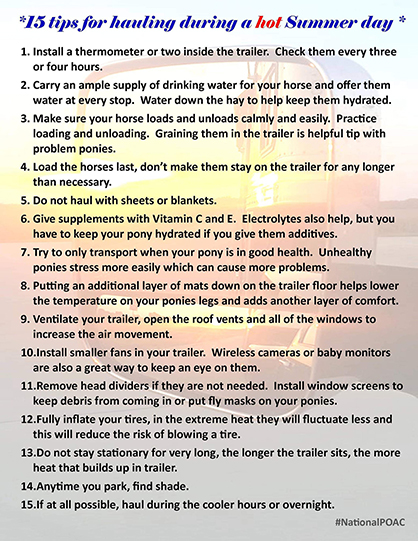Tips for Hauling Horses During Hot Weather
By Debra J. Hagstrom, MS, Equine Extension Specialist, University of Illinois
The summer horse show and trail riding season has arrived. Although the scorching hot temperatures have yet to hit, horse owners should be aware of how these approaching hot, humid conditions can affect their horses during transport to these events.
Hauling horses in hot weather should be a legitimate concern for horse owners. Failure to consider hot weather transporting needs can potentially lead to horses experiencing heat related health issues during hauling (dehydration, heat stroke or heat exhaustion) in addition to heat related health and performance issues upon arrival at their destination. For horses traveling in dark colored trailers the dangers are even greater as research has shown that, on a sunny day, a trailer with a dark exterior will be 20-30° hotter inside than a light colored trailer.
Even in the most ideal conditions, traveling is work for the horse. One transport study reported that riding in a trailer uses as much energy as walking because the horse uses muscular energy as it attempts to maintain its balance in a moving vehicle. Doing this continually for several hours results in a horse that arrives fatigued. Hauling older horses brings with it additionally concerns as they cannot regulate their body temperatures as well as younger horse.
Thinking ahead and planning can minimize problems and reduce the risk of heat related complications for horses. First, schedule your travels during the coolest parts of the day or better yet, travel at night. Think logically and load equipment and feed first while leaving your horse until last to minimize the amount of time he must stand in the trailer. Also, be sure to provide your horse free access to large quantities of water for the day or two prior to departure to ensure that he is properly hydrated at the trips start.
Keep in mind that during hot, humid weather the conditions inside the trailer are likely to be even hotter and more humid than the ambient conditions. As humidity increases, the horse’s ability to cool itself by sweating is significantly reduced. This is why adequate trailer ventilation is crucial. During hot, humid weather horses need as much ventilation as you can give them. Open all of the trailer vents and sliding windows as wide as possible for maximum air flow. If the trailer has directional roof vents open them forward to optimize air intake. Drop-down windows provide exception ventilation, however, only leave them dropped if bars or screens are in place in the window opening to prevent the horses from hang their heads out of the trailer. It is true that horses have been known to try exiting a trailer through the drop-down windows as well sustaining head and eye injuries from traveling with their heads hanging out.
Horses can lose 0.44 – 0.55% of body weight per hour during transportation with increased duration of travel increasing weight loss per hour. This weight loss is mainly due to water loss as a result of sweating, increased respiration and reduced water consumption. Therefore, dehydration is one of the first problems seen when horses are traveling. Dehydration can lead to reduced gut motility, which coupled with restricted activity imposed by hauling and reduced roughage intake can result in colic. Additionally, inadequate hydration contributes to heat exhaustion and heat stroke in horses.
Every four to six hours you should stop for a rest and watering break. Each stop should be at least 20 minutes long to allow time for your horse to relax and rest as well as urinate. Park in the shade whenever you stop and do not leave your horse in a parked trailer for an overly long time as lack of air flow while parked will rapidly increase the trailer’s interior temperature. At each stop offer cool, clean water to each horse in the trailer and give them time to decide to drink. Be aware that some horses are picky and will not drink water that smells or tastes unusual. Knowing this in advance will allow you to bring water on the trip that your horse is accustomed to drinking. In extreme heat, hosing your horse off or sponging him down with cold water will help him stay cool as well. However, horses should be off loaded to do this so that the trailer mats don’t get wet and slippery.
Another way to help minimize dehydration during transport is to give your horse electrolytes the day or two before, and perhaps the day of travel to stimulate him to drink more as well as to replace the electrolytes lost as he sweats during transport. It is important to realize, though that electrolyte treatment may not be appropriate for your horse or the specific transport situation. Therefore, the decision to give electrolytes must be made with input from your veterinarian.
It is recommended that for trips lasting longer than 12 hours horses be unloaded and given an 8 hour rest from trailering. There are many stables, fairgrounds, rodeo arenas, etc around the country which provide overnight accommodations for horses. Such facilities can be found on line at websites such as www.horsetrip.com or www.horseandtravel.com in addition to other similar web sites.
Using these strategies during hot, humid weather will help ensure that your horse travels as comfortably as possible and that he arrives at his destination with no ill effects from his trip.
Tips for Hauling Horses during Hot Weather – Horses (illinois.edu)











